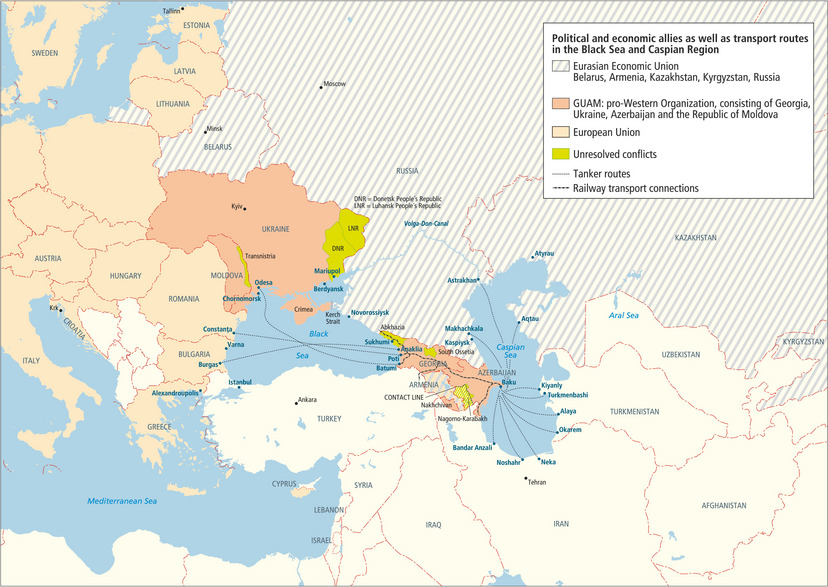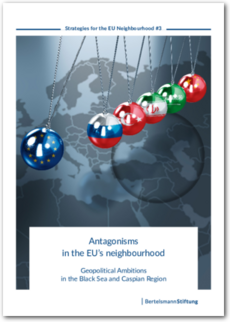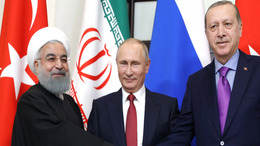The region connecting Europe and Asia is the site of several key trade and energy routes, while also featuring two EU member states and three NATO partners that border the Black Sea. The paper’s sober analysis identifies a series of strategic patterns of action taken by the Kremlin: the deployment of armed Russian Black Sea Fleet ships in the Syrian war and in the Mediterranean, the contravention of international maritime law by restricting the freedom of navigation, disrupting economically important transport and communication routes, and the expansion of Russian influence into the exclusive economic zones of coastal states.
![[Translate to English:] Schiffe auf dem Meer mit Bohrtürmen im Hintergrund](/fileadmin/files/_processed_/6/c/csm_781790850AdobeStock_84943428_KONZERN_ST-EZ_a34d89e351.jpg)
© Nightman1965 - stock.adobe.com
Geopolitical Ambitions in the Black Sea and Caspian Region
It’s common knowledge that the Russian Federation annexed Crimea from the Ukraine in a flagrant flouting of international law. Less widely known, however, is the manner in which Russia is going about consolidating its position in the Black and Caspian Sea region. Increasingly, this part of the immediate EU Neighborhood is being transformed into a conflict zone. Our new policy paper examines how Russia, Turkey, China and other powers in the region interact there and explores Europe’s opportunities for action.
States in the region whose sovereign rights are subjected to Russian transgressions, as currently Ukraine or Georgie, are too weak to resist the military, political and economic pressures placed on them by Moscow. Yet their economic and security interests are matters of concern to Europe as a whole. This is true for those states in the EU’s neighborhood that have signed association agreements with the EU such as Ukraine, Georgia and the Republic of Moldova as well as the EU member states of Romania and Bulgaria.
Russia is not the only key state expanding its sphere of influence into the EU’s immediate neighborhood. China in particular is aggressively pursuing its interests in Eastern Europe. Turkey is also a cause for concern. It is no longer clear whether Ankara is still a reliable ally. In the absence of forceful objections, Russia’s actions are encouraging copycat efforts. All three regional powers are intensifying their efforts to dominate both energy sources in the region and its transport routes for resources and goods.
In a policy paper titled “Antagonisms in the EU’s Neighbourhood – Geopolitical Ambitions in the Black Sea and Caspian Region,” the Bertelsmann Stiftung’s project known as “Strategies for the EU Neighbourhood” examines the motives driving actions taken by Russia, Turkey and China. The paper also examines Iranian and Saudi Arabian policies vis-à-vis the region. In addition to recommending specific responses to actions that are shifting the regional balance of power, the paper offers suggestions as to how Berlin and Brussels could better represent European interests in their immediate neighborhood.
Among the paper’s recommendations for defending European interests in the Black Sea and Caspian region are the establishment of a dedicated monitoring system able to provide reliable and rapid information on Russia’s actions, and the provision of more visible support for the EU member states of Bulgaria and Romania as well the EU-associated states bordering the Black Sea. The paper also calls on stakeholders to advocate more forcefully for compliance with international law so as to preclude military escalation while ensuring freedom of navigation and the security of important transport and energy infrastructure.
The Bertelsmann Stiftung’s Europe’s Future program aims to use its Key States Initiative to deliver suggestions as to how the EU can contribute to peace, stability and prosperity in its immediate neighborhood, from Belarus to Georgia, Syria and Morocco. The present paper offers potential strategies that could be implemented before developments in the region lead to acute conflicts. It aims to encourage policymakers to act in time by providing them constructive input for developing solutions, strengthening resilience and defusing crises before they escalate.





![[Translate to English:] Ein Mann läuft durch eine komplett zerstörte Straße](/fileadmin/files/_processed_/d/e/csm_91467146816969008478_36ccc11324_o_8477bfdb23.jpg)



